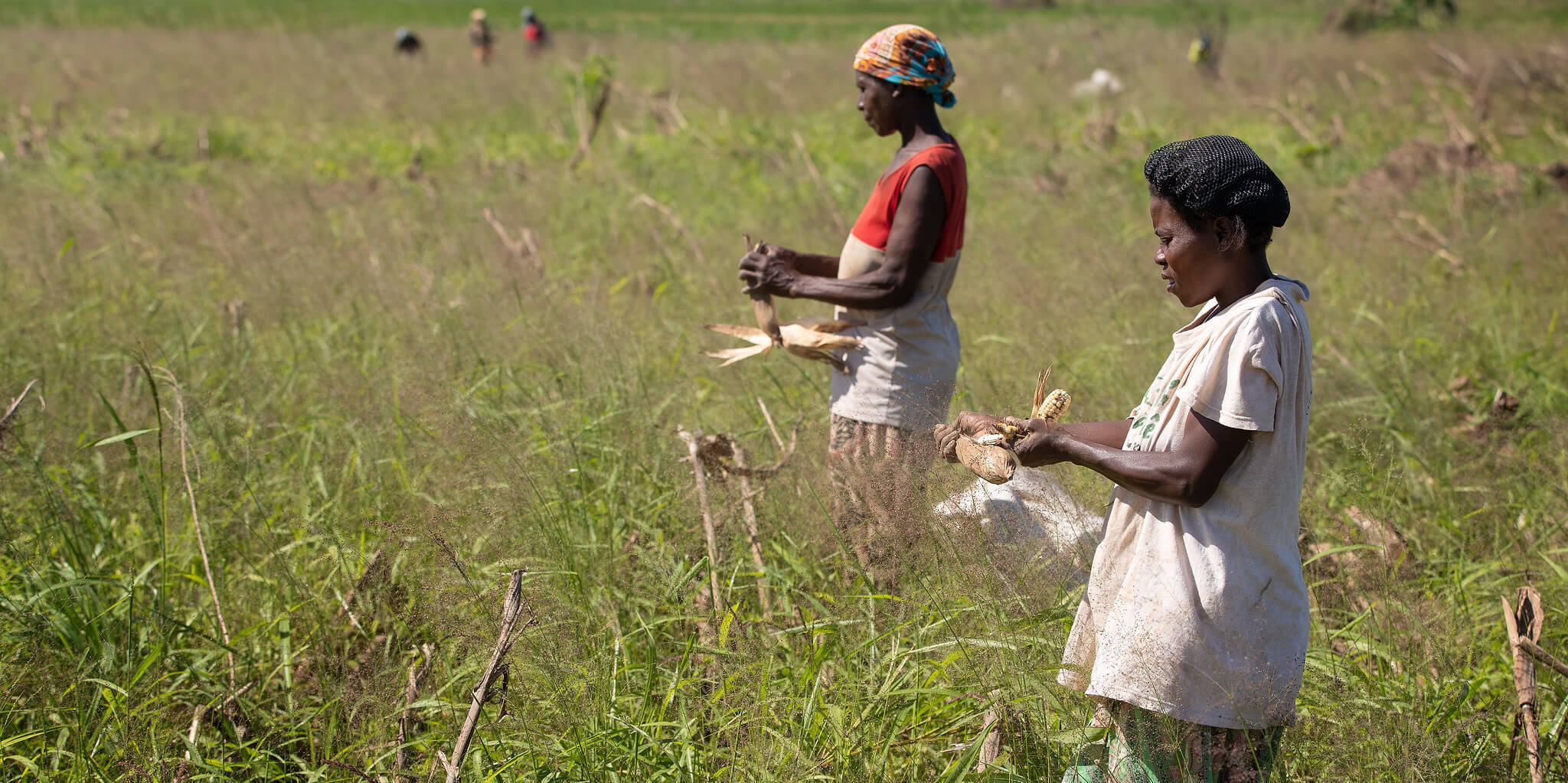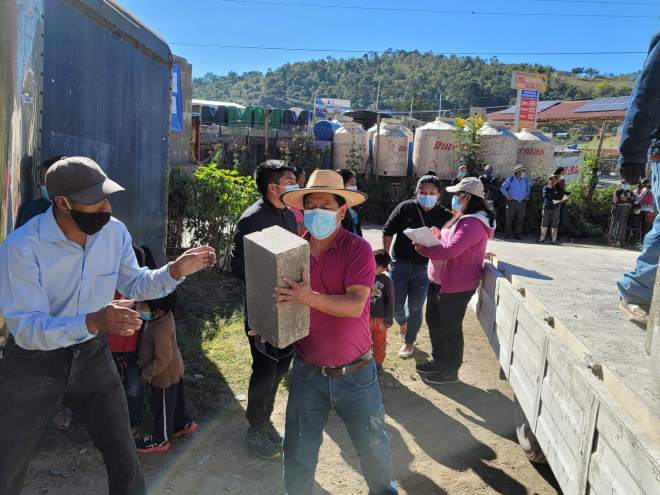
Isabel João (right) and Maria Lidia António salvage what they can of their corn crop, which was killed before it matured when their field was flooded by Cyclone Idai in Buzi, Mozambique, 2019. Hit again by cyclone Eloise in 2020, Mozambique now deals with rising COVID-19 cases and armed conflict causing major displacement in its northern region. Better agricultural production is an urgent need here. PHOTO: MIKE DUBOSE, UMNS
Global Ministries’ Board of Directors affirmed bold new mission programs to answer God’s call to serve the world as it is today, even while uncertainties about the economy, the global coronavirus pandemic and the future of The United Methodist Church remain unresolved.
By Christie R. House
March 30, 2021 | ATLANTA
In charting a path for mission in 2021 and beyond, the General Board of Global Ministries will not be returning to “pre-2020” methods of operation, even when the coronavirus pandemic subsides.
“That world has changed,” Global Ministries general secretary, Roland Fernandes, indicated to the Board of Directors, meeting virtually March 24-26. The mission agency, The United Methodist Church, and the world in the throes of a global pandemic have all undergone significant change, making it counterproductive to try to return to a pre-2020 “normal.”
“We are in a new mission age into which God has swept us,” Fernandes said in his opening address, quoting a phrase from the agency’s Theology of Mission statement. “And because we are in a new place in our history, we must boldly evaluate our ways and means under the critical oversight of the Holy Spirit as represented by Scripture and our Wesleyan heritage. We must confront the question: Do our programs and practices share the love of God in this age?”
To answer that question, Global Ministries has already begun a full assessment of its programs. Conducted in four phases, with a goal to create a strategic plan for 2022-2024, staff has built a program inventory.
The next phase of the project will use a framework to analytically assess each program to share with directors and guide the strategic plan. Fernandes stressed that these programs should then define the structure of the agency, rather than the structure of the agency defining the programs. A review of Global Ministries many different grant processes, developed over a long history, is also underway.
The urgent task for staff and directors is to discern the ways that God is leading the church and the agency in mission today, to develop a flexible and focused plan that is faithful to the gospel and its purpose of coordinating and connecting United Methodists in mission.
Addressing urgent needs
Along with grants and funding requests from regular budgetary channels, directors approved four proposals made possible by funds outside the 2021 budget. World Service receipts, derived from churchwide apportionments, came in nearly 30% higher at year’s end than predicted earlier in the year. In addition, Global Ministries received two significant bequests for UMCOR and Global Ministries in 2020.

PHOTO: MARÍA DE LOURDES RAMÍREZ MROCZKA
A total of $5 million was approved by directors for the following:
- $2 million for the Yambasu Agriculture Initiative, extending a commitment to food security and the productive use of church land for agriculture and income generation in Africa. The initiative is named for Global Ministries’ late vice president, Bishop John K. Yambasu of Sierra Leone, who died suddenly in a car accident last year.
- $1 million for environmental sustainability centered on the proposed United Methodist commitment to net-zero greenhouse gas emissions by 2050, developing programs to reduce emissions across Global Ministries sites and ministries while increasing access to renewable energy and supporting local United Methodist initiatives.
- $1.1 million to extend the partnership with Church World Service begun last year. CWS plans to hire additional staff for UMC border shelters, provide case management with asylum seekers and advance advocacy for rebuilding a humane immigration system in the United States. Erol Kekic of CWS joined the meeting to explain the importance of restoring refugee and legal asylum programs devastated over the last four years. “In our opinion,” Kekic said, “more social work and immigration judges and less detention is the best way to relieve the pressure on the border and deal with the caseload already here. We believe that if we can build a solid enough body of work and demonstrate success at scale, we can present our model to the U.S. Government as a better option and end detention as a tool of migration management.”
- $750,000 from UMCOR funds for Global Health to continue work of the Abundant Health Initiative that could not be completed in 2020. This includes strengthening health systems at household, community and health facility levels, particularly by improving and expanding small primary health care facilities, which are the first health services used by about 80% of the population in Africa.
Also approved by directors for the 2021 budget:
- More than $1.1 million for Imagine No Malaria for malaria diagnosis, treatment and training in six African episcopal areas. In total, Global Health grants approved for Maternal, Newborn and Child Health, Health System Strengthening, Imagine No Malaria and Water, Hygiene and Sanitation projects exceeded $1.5 million.
- $2,788,681.41 in grant funding for UMCOR, with $712,507 in U.S. Disaster Response funds to support the Louisiana Conference for ongoing storm recovery and nearly $100,000 for the Florida Conference to strengthen disaster preparedness.
- Nearly $500,000 for scholarships from World Communion funds for students from central conferences pursuing higher education and graduate study and leadership grants for U.S. racial/ethnic students.
- $100,000 for the new Community Development Conference Cohort Program getting underway in five U.S conferences. Programs focus on food insecurity, educational support for low-income students, economic and social support, and historical trauma resources and programming with Native American communities.
Fernandes said that, despite the challenges of working through Zoom and the uncertainties facing the church, he perceived positive energy throughout the meeting: “Directors were affirming of the direction in which we are heading, even with all the unknowns ahead.”
Bishop Hee-Soo Jung, Wisconsin Annual Conference, preached on Mark 4:36-41 (Jesus quiets the storm). “In such time as this we are called to be stewards of global mission,” he said. “It is significant work.”
Called to serve anyway
The meeting’s theme, “Serving Faithfully Amid the Tensions,” is also the subtitle of Global Ministries’ recently published book, “Methodist Mission at 200,” which commemorates two centuries of witness and service dating back to the first denominational missionary society formed in 1819.
Bishop Joaquina F. Nhanala of Mozambique, the board’s vice president, led worship with a message from Acts 20:17-24, which describes Paul’s mission in an environment of anxiety, stress, fear, violence and disease. Yet, Paul answered God’s call to serve anyway. The tensions of serving God today are not unlike those encountered by the first-century church, yet, when God calls, “We choose to answer with a yes,” Nhanala said.
In addition to the coronavirus pandemic and a struggling economy, Nhanala’s home country has the added hardships of devastating cyclones from which Mozambique has not yet recovered and a resurgence of armed conflict in its northern region. Nhanala’s episcopal area has struggled to provide for growing numbers of displaced people fleeing both violence and flooding.
“We are called to serve faithfully,” Nhanala concluded, “in a world that needs salvation.”
Christie R. House is a consultant writer and editor with Global Ministries and UMCOR.

